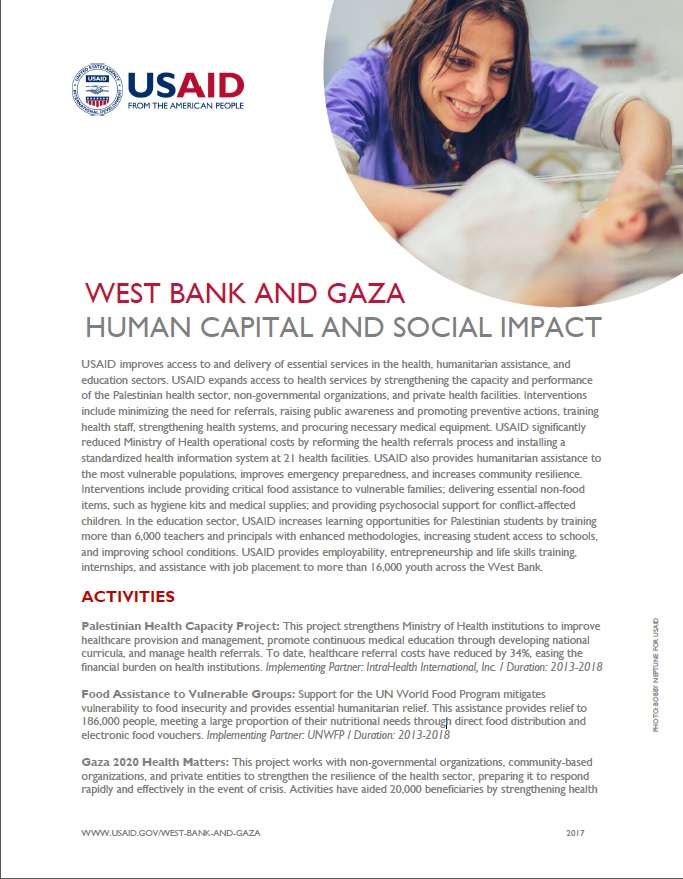Human Capital and Social Impact Fact Sheet ![]() (pdf - 210k)
(pdf - 210k)
USAID improves access to and delivery of essential services in the health, humanitarian assistance, and education sectors. USAID expands access to health services by strengthening the capacity and performance of the Palestinian health sector, non-governmental organizations, and private health facilities. Interventions include minimizing the need for referrals, raising public awareness and promoting preventive actions, training health staff, strengthening health systems, and procuring necessary medical equipment. USAID significantly reduced Ministry of Health operational costs by reforming the health referrals process and installing a standardized health information system at 21 health facilities. USAID also provides humanitarian assistance to the most vulnerable populations, improves emergency preparedness, and increases community resilience. Interventions include providing critical food assistance to vulnerable families; delivering essential non-food items, such as hygiene kits and medical supplies; and providing psychosocial support for conflict-affected children. In the education sector, USAID increases learning opportunities for Palestinian students by training more than 6,000 teachers and principals with enhanced methodologies, increasing student access to schools, and improving school conditions. USAID provides employability, entrepreneurship and life skills training, internships, and assistance with job placement to more than 16,000 youth across the West Bank.
ACTIVITIES
Palestinian Health Capacity Project: This project strengthens Ministry of Health institutions to improve healthcare provision and management, promote continuous medical education through developing national curricula, and manage health referrals. To date, healthcare referral costs have reduced by 34%, easing the financial burden on health institutions.
Food Assistance to Vulnerable Groups: Support for the UN World Food Program mitigates vulnerability to food insecurity and provides essential humanitarian relief. This assistance provides relief to 186,000 people, meeting a large proportion of their nutritional needs through direct food distribution and electronic food vouchers.
Gaza 2020 Health Matters: This project works with non-governmental organizations, community-based organizations, and private entities to strengthen the resilience of the health sector, preparing it to respond rapidly and effectively in the event of crisis. Activities have aided 20,000 beneficiaries by strengthening health networks through improving emergency preparedness and response, training staff, purchasing health commodities, providing psychosocial support programs, and conducting health awareness campaigns.
Introduction of the Rotavirus Vaccine to Children of the West Bank: This project supports the introduction of the rotavirus vaccine into the Palestinian Ministry of Health’s national program on immunization and will provide vaccines to 100,000 children throughout the West Bank.
Promoting the Quality of Medicine: This project supports medicine suppliers to increase production for local and export markets by assessing their production systems and helping them meet WHO Good Manufacturing Practice and quality standards.
Access to Success I and II: These projects each offer ten scholarships for students to pursue a dual BA from Al Quds University and Bard Honors College for Liberal Arts and Sciences. The scholarships provide a unique opportunity for young Palestinians to participate locally in the Bard College learning experience on the Al Quds University campus.
Leadership and Teacher Development: This project improves the competencies of teachers and principals through a decentralized approach to training and leadership development. To date, the activity has trained more than 6,500 Ministry of Education cadres on student-centered approaches to teaching and learning.
Masters of Arts in Teaching: This project offers a two-year course of study for a joint Master’s degree in teaching from Bard College and Al Quds University. As a result, more than 242 in-service teacher graduates are applying student-centered approaches in the classroom.
Master’s Scholarship Project: This project provides 20 scholarships for Palestinian students to pursue graduate degrees in the United States. These scholarships enable students to acquire the knowledge and skills necessary to develop the Palestinian economy.
Partnerships with Youth: This project supports more than 16,000 youth participating in a wide range of educational and leadership activities at USAID-supported Youth Development Resource Centers and a network of youth clubs across the West Bank.
School Support Program: This project enhances the quality of education in 50 marginalized schools through a holistic approach that includes training, enhancing school infrastructure, providing equipment and supplies, and increasing parent and community engagement in school activities.
Youth Cohort Study: This project will conduct a youth cohort study and other independent research to gather evidence about the effectiveness of the USAID Partnerships with Youth activity. The aim of this study is to inform USAID programming through identifying strategies to increase the impact of investments in youth.








Comment
Make a general inquiry or suggest an improvement.